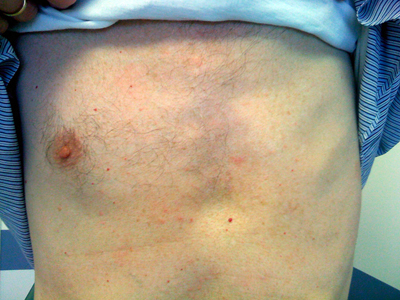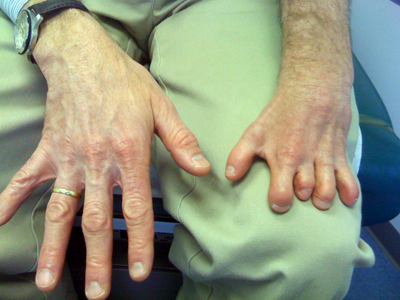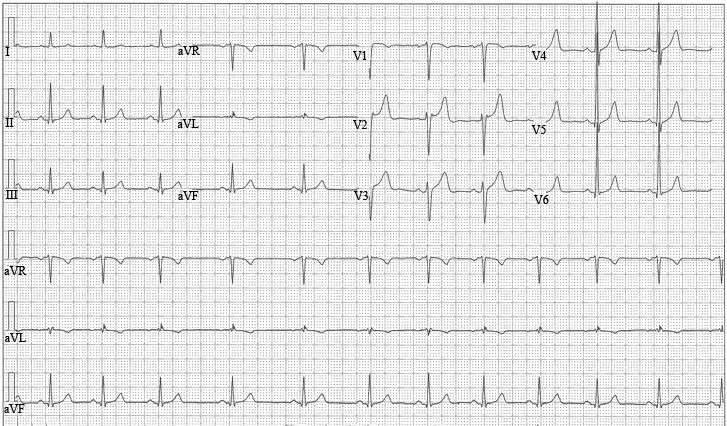For those unfamiliar, this syndrome involves the absence of sternal head of the pectoralis major, hypoplasia and/or aplasia of breast or nipple, deficiency of subcutaneous fat and axillary hair, abnormalities of rib cage, and upper extremity anomalies. The upper extremity anomalies include short upper arm, forearm, or fingers (brachysymphalangism). Remarkably, I had never seen one of these cases in my clinic before, but met a nice gentleman recently who thought his syndrome was called "Pol's Syndrome, or something like that," and with the quick help of Google, he and I quickly surfed the web together in my office and discovered he actually had "Poland's Syndrome."
I was referred to see him for non-sustained asymptomatic ventricular tachycardia noted on a recent stress test. Consequently, an EKG was performed. Before I get to that, my patient was nice enough to permit me to include the photos of his chest and upper extremities and share them here:

The Chest of a Patient With Poland's Syndrome
Note the congenital abscence of the left nipple and pectoralis muscle.

Hands of a Patient With Poland's Syndrome
The left hand has gone under significant reconstruction to permit an opposable thumb and individual digits.
So now, in the spirit of collegiality in medicine, I'd like to add one more thing to the syndrome: possible "pseudo-ventricular hypertrophy on the EKG when the left pectoral muscle is absent." Here's the patient's EKG:

EKG of a Patient With Poland's Syndrome - Click to Enlarge
Note the present of large precordial voltage suggestive of left ventricular hypertrophy due to proximity of the EKG leads to the heart.
There. This modification to the syndrome is now etched in the highly scientific ether of the blog-o-sphere. Of note, his echocardiogram failed to demonstrate any left ventricular hypertrophy or cardiac anomaly.
-Wes
12 comments:
Nice, very nice! Love that your patient allowed you to share with us.
What about the VT?
jimcmd-
What about the VT?
Non-sustained, normal ventricle -> treated conservatively with beta blockers for now.
Do you use ranexa much? If so, thoughts? Also, any patients c/o severe tinnitus?
Very interesting!
Great case.
How about the cardiac exam?
Heart sounds louder than normal w/o pectoralis muscle? PMI easily palpable or even visible since he's a thin guy?
CardioNP
Hello, I have Polands syndrome and Moebius, I came across this blog and found it very interesting.
I am a 64 year old mail with Poland's Syndrome. I have both pectoralis muscles missing and ribs 2,3,4 missing. I had a heart attack where they did 6 bypasses. It was much easier because of the missing ribs and muscles. Iwent back to work in 6 weeks.
Dr. Wes, I am a regular visitor of your blog and I love it. I was wondering if you would give us permission to use your images of poland syndrome patient on our website www.pedsquiz.com We will give credit to you by posting your name and linking back to your blog next to the image. If you agree, please submit the images to our website at this link: http://www.pedsquiz.com/2002/03/image-submission.html
If you have any problems uploading or questions, please email me at the following address: info at pedsquiz d0t c0m
Thank you!
Hi guys, Im an 18 year old male and also have poland syndrome, i was born without a left pectoral. Great to see other peoples storys.
hi dr
tht was v nice of u to have shared
ur experience with us... v interesting about the cardiac involvmnt..
dr bhavana shree
chennai
I, too, have Poland's Syndrome (a lot of bilateral problems). I also have tachycardia (Inappropriate Sinus Tachycardia I think is the diagnosis). I've often wondered if there was any correlation between my PS and my rapid heart rate. Thanks for posting this info!
Post a Comment